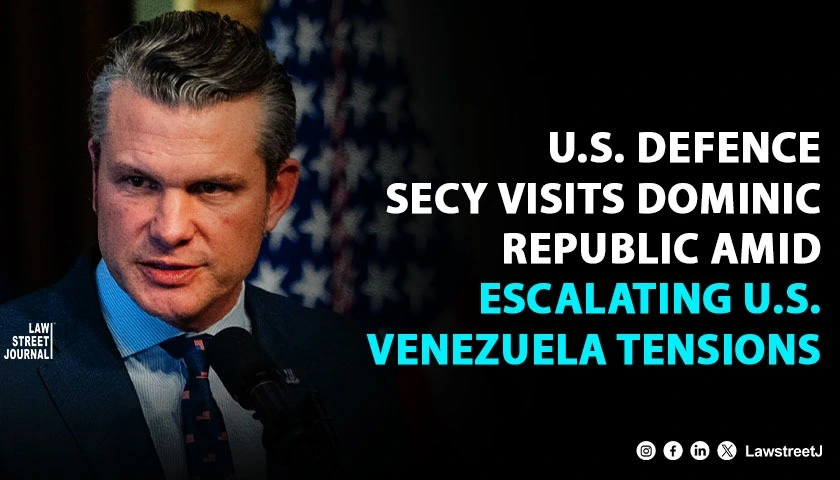New York: U.S. Defense Secretary Pete Hegseth arrived in the Dominican Republic on Tuesday for a series of high-level security meetings, marking an important moment in Washington’s expanding anti-narcotics efforts across the Caribbean. The visit comes as tensions between the United States and Venezuela continue to rise, driven by legal disputes linked to drug-trafficking networks and regional security challenges.
Strategic Defense Diplomacy
Hegseth’s visit, confirmed by the Pentagon on November 25, is part of the Trump administration’s broader security outreach in the Caribbean region. His schedule includes meetings with Dominican President Luis Abinader, Defense Minister Lt. Gen. Carlos Antonio Fernández Onofre, and senior officials responsible for national security and maritime policy.
The discussions will center on counter-narcotics operations, maritime surveillance, and long-term defense-cooperation mechanisms. The Dominican Republic has emerged as one of Washington’s most important security partners in the Caribbean, with its geographic position placing it at the center of regional interdiction routes and making it a key ally in U.S. efforts to curb transnational criminal activity.
The visit aligns with ongoing programs under the U.S. Caribbean Basin Security Initiative (CBSI), established in 2010 to assist Caribbean nations in strengthening borders, law enforcement, and judicial systems. Since its launch, the CBSI has received more than $600 million in U.S. funding, with the Dominican Republic among its largest recipients.
Pentagon officials have emphasized that these engagements reinforce commitments under Title 10 of the U.S. Code, which outlines the legal authority for U.S. military cooperation abroad. The meetings in Santo Domingo are expected to support intelligence coordination, joint maritime patrols, and operational frameworks designed to target drug-trafficking networks operating across the Caribbean Sea.
Hegseth’s arrival takes place against the backdrop of escalating friction between Washington and Venezuela. The U.S. Department of Justice has accused Venezuelan President Nicolás Maduro of involvement in large-scale cocaine trafficking through a criminal organization referred to as the “Cartel of the Suns.” The allegations stem from investigations conducted under the Foreign Narcotics Kingpin Designation Act (21 U.S.C. § 1901).
In March 2020, U.S. prosecutors unsealed indictments naming Maduro and 14 senior Venezuelan officials. The charges include narco-terrorism, corruption, and drug trafficking. These indictments carry legal implications under international agreements, including the 1988 United Nations Convention Against Illicit Traffic in Narcotic Drugs and Psychotropic Substances. Both the United States and Venezuela are signatories to the treaty, which obligates members to cooperate in suppressing drug trafficking and related offenses.
In addition to criminal charges, the U.S. Treasury Department has issued sanctions under the Global Magnitsky Act. These sanctions freeze assets and impose travel restrictions on individuals linked to the alleged trafficking network. Although the Dominican Republic maintains diplomatic relations with Venezuela, it remains aligned with U.S.-led regional anti-drug initiatives and continues to cooperate closely with U.S. enforcement agencies.
Hegseth’s visit is expected to reinforce legal coordination tools such as mutual legal assistance treaties (MLATs) and extradition agreements, which are critical for facilitating cross-border investigations and prosecutions involving transnational organized crime.
Regional Stability and Legal Frameworks
The visit also coincides with increased U.S. naval operations in the Caribbean, particularly under Operation Martillo, a multinational mission targeting illicit maritime trafficking routes. The operation is conducted under a combination of legal authorities, including Title 10 and Title 22 of the U.S. Code, which govern defense activities and foreign-relations programs.
Regional organizations have been monitoring the growing security challenges. The Organization of American States (OAS) has repeatedly appealed for stronger coordination among member states to counter expanding drug-trafficking networks in the Caribbean Basin. The Dominican Republic’s involvement in the Inter-American Drug Abuse Control Commission (CICAD) positions it as a lead partner in implementing legal and policy measures aimed at reducing drug trafficking and supporting justice-sector reforms.
The diplomatic and security agenda surrounding Hegseth’s visit also touches on obligations under the Inter-American Treaty of Reciprocal Assistance, widely known as the Rio Treaty. Article 3 of the treaty allows for collective action in response to threats against regional peace and security. Although Venezuela’s participation remains contentious, the treaty’s provisions are central to discussions on coordinated defense efforts in the hemisphere.
The Dominican government has been working to enhance its capacity to intercept maritime-trafficking operations by upgrading naval assets and strengthening cooperation with U.S. Southern Command (SOUTHCOM). Joint exercises and intelligence-sharing programs have been recurring components of the bilateral security relationship.
The timing of the visit highlights Washington’s intention to consolidate its partnerships at a moment when drug-trafficking patterns are evolving. The Caribbean has seen an increase in narcotics-transit activity, partly due to shifting enforcement dynamics in Central America. As a result, U.S. officials have emphasized the importance of reinforcing security infrastructures in nations like the Dominican Republic, which occupy key maritime chokepoints.







